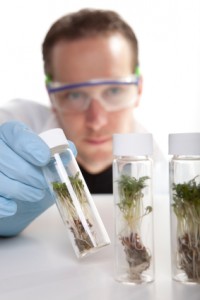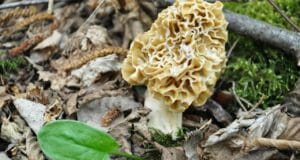Big agriculture and the life sciences industry have developed a symbiotic relationship that has proven fruitful – and profitable – for both sides. The result has been a flood of genetically engineered seeds, animals, and food crops that have entered the food chain since the 1980s, forever revolutionizing the way that farmers produce food for animal and human consumption. Not content to rely on the carefully crafted handiwork of the Creator, scientists working in the tradition started by Dr. Frankenstein so many years ago have total faith that they can improve on the Lord’s work and produce food sources that are superior to the plants and animals that have been feeding billions of humans throughout the ages.
 But as we might expect from such hubris, things have proven to be far less fantastic than advertised. Numerous questions have been raised about the safety and reliability of all these genetically altered food products, and this has included concerns about how the introduction of bio-engineered crops into the real world might impact the evolutionary pathways of other life forms. Now, a situation has arisen in the cornfields of Iowa that underscores the kind of threat that accompanies the release of man-made creations into the natural environment.
But as we might expect from such hubris, things have proven to be far less fantastic than advertised. Numerous questions have been raised about the safety and reliability of all these genetically altered food products, and this has included concerns about how the introduction of bio-engineered crops into the real world might impact the evolutionary pathways of other life forms. Now, a situation has arisen in the cornfields of Iowa that underscores the kind of threat that accompanies the release of man-made creations into the natural environment.
Fields of Dreams, or Fields of Nightmares?
One of the ways that the so-called “life sciences” corporations responsible for providing the raw materials for our food supply try to improve on nature is by creating seeds that grow plants capable of producing their own poisons to protect against damage from insects and other small living things. In Iowa, one popular brand of genetically engineered corn is supposedly resistant to rootworm damage because of its ability to synthesize biochemicals toxic to this destructive insect. However, rootworms resistant to the effects of this toxin have now been found in four cornfields by an entomologist from Iowa State University. No one doubts that this is only the beginning, and that this new type of rootworm will quickly expand to other fields, as nature always prefers mutations that confer survival advantages.
Throughout the Farm Belt, farmers have been rapidly embracing bio-engineered food crops with the capacity to kill potential predators through “natural” means. In addition, herbicide-resistant crops have been heavily promoted by the life sciences industry and adopted by farmers en masse. These plants can withstand high levels of herbicide without suffering damage, allowing farmers to use heavy amounts of weed killers to rid their fields of unwanted invaders. The promulgation of these toxic stews in the farm fields of America has become a part of the new methodology for producing bountiful crops, replacing the old pattern of frequent crop rotation as a way to help preserve the land and the vitality of the soil. When soil is able to maintain its natural rich density of life-giving nutrients, it allows farmers to grow healthier plants with natural resistance to predators (insects and harmful microbes tend to attack nutrient-deficient plant life first). Unfortunately, this old common-sense approach to agriculture has largely been abandoned in favor of an industrial-style approach that uses scientific trickery combined with relentless mechanical exploitation designed to overwhelm nature and force it to produce despite of itself.
At first consideration, the problem of predator adaptations like that of the Iowa rootworm may not seem like an especially serious problem. But what must be realized is that this process of evolutionary change spurred on by man’s reckless disregard for the dictates of God and nature is not something that can be expected to stop. More than twenty million acres of farmland in the Midwest and South are now plagued by superweeds resistant to all herbicides, thanks to the widespread use of herbicide-resistant crops by farmers in these parts of the country. Super predators like the rootworms that are currently poised to march across the cornfields of Iowa will also keep evolving, and they will keep infesting more and more acreage because that is nature’s way – superior life forms are the ones that thrive, spread, and survive.
Even though invaders and pests that can be destructive to plant life have been around since the beginning of time, the delicate balance of nature given to us by the Creator has always had mechanisms available to make sure that things never stayed too far out of balance for too long. But in the dialectic between biotechnology and evolutionary change, things only move in one direction: insects and microbes evolve to resist the defenses of genetically engineered plants, and scientists then respond by creating new crops capable of combating the ravages of the new superbugs and superweeds – which then mutate again to become even stronger in their resistance, causing still another response by scientists, and so on ad infinitum. As this one-way process plays itself out, it is a distinct possibility that destructive life forms may eventually evolve that are so hardy, fertile, and resistant to the advances of genetic science that they will be capable of wiping out crops broadly and indiscriminately across the globe, leading to massive food shortages and waves of mass starvation.
Or, alternatively, life scientists who have given themselves permission to play God may accidentally create something cataclysmic and apocalyptic all on their own. And the scary thing about this possibility is that it is not theoretical – it has actually already happened.
Klebsiella Planticola: The Real-Life Frankenstein’s Monster
In the early 1990’s, a European biotechnology corporation was all set to release a genetically modified version of a common plant bacteria called klebsiella planticola, which normally helps break down dead organic material so it can be re-absorbed into the soil. The new strain of this microbe was genetically altered to create two useful substances from undifferentiated dead biomass: alcohol and organic fertilizer. The new microbes would be spread on cropland after harvest, and the products they produced from dead and dying plants could then be collected and sold on world markets.
There was only one problem with this scheme. The genetically modified klebsiella planticola, unlike the natural version, did not terminate after finishing its work. On the contrary, the new microbe survived the fermentation process it instigated in order to create alcohol from raw plant material, and if it had been released into nature as a part of fertilizer, it would have immediately attacked any plant life growing in adjacent soil, setting off a process of alcohol fermentation that would inevitably lead to the death of that plant life. As the new bacterium divided and multiplied, it would then have continued to spread from plant to plant, from field to field, from forest to forest, and so on, until it had wiped out every living plant on the face of the earth. If this genetically-engineered form of klebsiella planticola had actually been released into nature, it could have literally scoured the surface of the entire planet unless scientists had been able to come up with some kind of miracle to stop it.
What is most frightening about this situation is that this apocalypse microbe had actually been approved for use by regulatory agencies responsible for monitoring the creation of new geneticallyaltered life forms. It was only because of a fortuitous and random review of this new form of klebsiella planticola by a professor at Oregon State University that its potentially devastating effects were discovered before it could be released onto the market.
Heeding the Warnings
The story coming out of the Iowa cornfields is only the latest piece of evidence that reveals the dangerous road that we have embarked upon. God created nature in a way that was perfectly balanced and capable of meeting the needs of all creatures great or small, without the need for arrogant intervention by men and women convinced they know better. If we are not careful, we are ultimately going to genetically engineer ourselves right out of existence.
©2011 Off the Grid News
——————————————————-
 Off The Grid News Better Ideas For Off The Grid Living
Off The Grid News Better Ideas For Off The Grid Living




